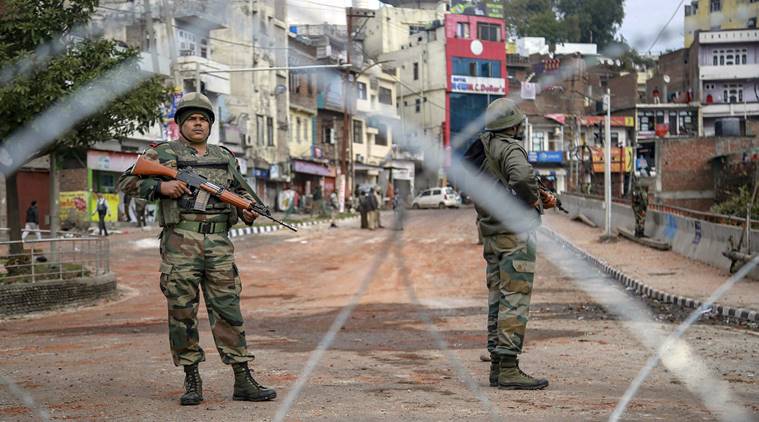
As two nations stand poised at the edge of a precipice, a section of civil society is engaged in hate-mongering and war hysteria as a recreational sport. In this surreal atmosphere, the young, grieving widow of Squadron leader Ninad Mandavgane, who was killed in the MI 17 helicopter crash in Kashmir, made a poignant appeal for calm between India and Pakistan. “We do not want a war. You do not realise the damage a war inflicts on people. No other Ninad should be lost from either side,” Vijeta Mandavgane said.
She lashed out at those calling for war: “I would request the social media warriors to stop doing what they are doing… If you have so much ‘josh’, then join the force and see how it feels.” At her husband’s cremation in Nashik, she urged the sloganeering group to stop spreading communal hatred. Even in her inconsolable grief, she was appalled by the negative emotions that her husband’s ultimate sacrifice had engendered.
Tragically, in this time of grave national crisis, hers is one of the lone voices of sanity. It is frightening to hear the WAR (wise after retirement) veterans — retired armed forces men and diplomats — spewing venom and cheerleading for strong military action and war if necessary, careless of the consequences. As for the media in general, the most telling statement of militant jingoism was the image of a TV anchor in military-regalia spouting anti-Pakistan wisdom.
It is significant that consequent on the Pulwama horror, the Union Ministry of Information and Broadcasting issued an advisory to all TV channels against any content which is likely to incite violence or “contains anything against the maintenance of law and order or which promotes anti-national attitudes” or that would affect “the integrity of the nation”. In line with this policy, show-cause notices were issued to two private TV channels for telecasting footage of a news briefing by the Pakistan army. Considering the low credibility of Pakistan’s army briefings, which are not taken seriously in our country and the futility of trying to sanitise social media which first aired the report, the clip was rather benign when compared to the inflammatory rhetoric of mainstream TV anchors that clearly threatened the unity and integrity of the nation.
Apart from calling for an all-out war against Pakistan, some TV anchors claimed that the stone-pelters in Kashmir were becoming terrorists. Dire warnings were issued to those who differed with the bellicose discourse. The “nation wants to know” TV anchor and government drummer-boy warned dissenters: “You are for or against the nation. You will be marked out if you are against the nation.” Unfortunately, in the current fraught atmosphere, it would be blasphemy to suggest that criminal action should be taken against them.
We politicians are the archetypal opportunists, scouting for possibilities to advance our interests even when we confront a national tragedy. Death and destruction at the borders are so much grist in the election calculus. Much has been made of B S Yeddyurappa’s smug assertion that the pre-emptive air strikes would help the BJP to win 22 Lok Sabha seats in Karnataka. But the fact is that while Yeddyurappa was guileless in making those comments, equally cynical and opportunistic was Mamata Banerjee’s innuendo that the Pulwama attack was allowed to happen. Sadly, politicians of all hues have been conducting their macabre dance on the dead bodies of our bravehearts.
A vibrant democracy encourages a free flow of ideas, especially in times of crisis. In fact, national security is better served when diverse voices are heard that could inspire improved decisions by the policy-makers. The widespread belief that when faced with a threat to the nation, society must speak in one voice and accept without demur what the government decides, is fraught with danger as it undermines democratic functioning. After all, freedom of speech is the lifeblood of democracy. National security cannot be the excuse for curbing freedom of expression or for distorting or hiding the truth from the public on issues of national import.
As an incorrigible pacifist, I have a deeper concern. According to defence experts, the surgical strike 2.0 has signalled a decisive shift in India’s policy towards Pakistan and cross-border terrorism. With Indian fighter jets crossing the LoC for the first time since 1971 and dropping bombs on a terror camp in Balakot, India has displayed a new muscular assertiveness in dealing with terror attacks emanating from Pakistan soil. Hitherto, India had adopted the dogma of “strategic patience” for fear that aggressive tactics and escalation could spin out of control and result in nuclear war. But now, much to the satisfaction of our defence hawks, the strategy seems to be “offensive defence”. Will this doctrine ensure the elimination of terrorism or its reduction? I’m afraid that this policy will make matters infinitely worse for both countries. Pakistan has already shown that there will be retaliation. Ultimately, only the number of dead on each side may differ. There can be no winners in such a conflict.
We would do well to remember the American experience in Afghanistan. In response to the September 11 attacks, the US with its NATO allies invaded Afghanistan in October 2001 and drove the Taliban from power. Since then, the Taliban has launched numerous attacks on the government and US forces. After 17 years of war which has cost the US more than $1 trillion and the death of 2,400 soldiers, the US has backed down and is now holding negotiations with the Taliban in the desperate hope of bringing peace to that benighted land.
Margaret Atwood had perceptively observed that “war happens when language fails.” The only hope for peace in the subcontinent is for India and Pakistan to resume dialogue.
(The writer, a former civil servant, is secretary general of the Lok Janshakti Party)